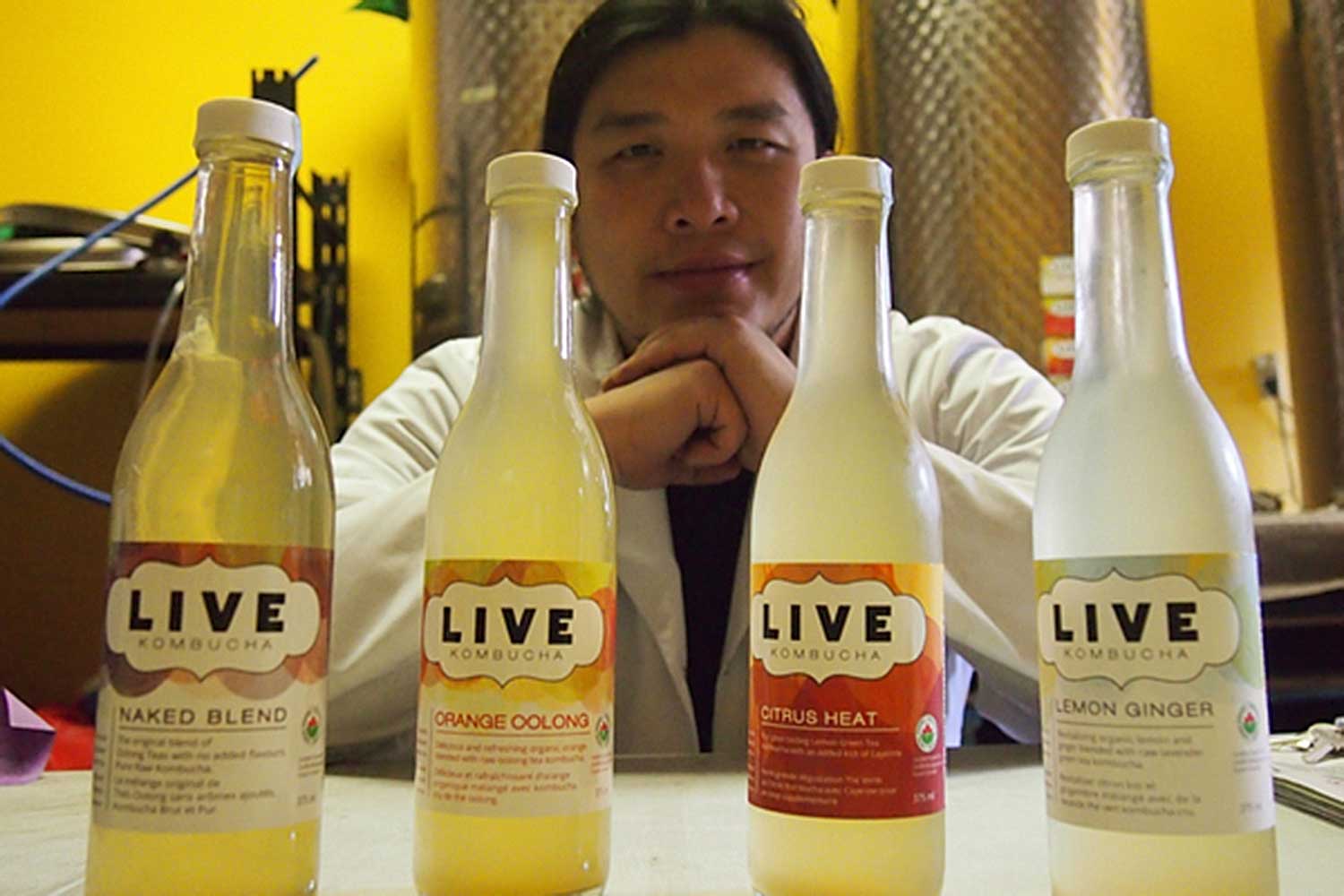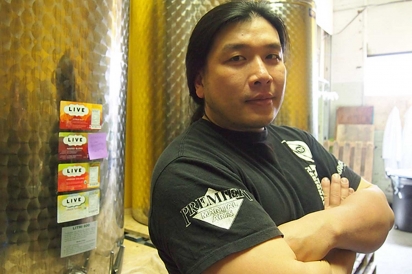LIVE Kombucha
What happens when you take some potent wine know-how and mix it with a favourite potion?
I recently met with brew master Lorman Ip to learn the story behind LIVE Kombocha, his somewhat new and fast-growing business. Lorman humbly divulged the unique story of how he’s come to blend two of his life passions to create a business rooted in a tasty and healthful beverage.
Lorman’s interest in brewing took hold long ago. He recalled being mystified as a child when a teacher explained how sugar cane is used to make rum. It wasn’t long before he went home, took the sugar out of the cupboard, mixed it with some water and a little yeast, and started his very first batch of home brew. And although he never did build up the courage to try his first brewed mixture, that growler he filled sat a-brewing in his parents’ house until its eventual demise when they moved twelve years later.
Growing up in an Asian household, Lorman was surrounded by tea and remembers watching a particularly touching documentary on the art of tea when he was a teenager. He soon started experimenting with tea at home and went on adventures seeking out the best clay tea pots, assorted tea sets, and other accessories. He became a familiar face at Shing and Ming in Markham, a Chinese tea shop known for its top-notch products. He developed a close relationship with the shop’s owner, a fourth-generation tea expert who pulled him further into the vast world of tea.
Lorman explained to me how tea is often a part of major life ceremonies in Asian cultures. In particular, weddings in China traditionally revolve around the bride and groom offering tea to their parents and prospective in-laws. To officially tie the knot, the in-laws have to accept the ceremoniously offered cup of tea. Zen monks also consume tea for its relaxing properties, and the beverage has long been known to have mild euphoric effects. “Tea is a pivotal part of all Asian culture, and I took that to heart,” says Lorman.
After high school, Lorman completed a specialist honours degree in neuroscience at the University of Toronto before doing a master’s in nutritional neuroscience at the University of Guelph. Always fascinated by the connection between diet and health, he decided to continue with a PhD at Guelph. His doctoral research looks at the roles B vitamins have on brain health.
While working on his doctorate, Lorman’s interest in brewing was once again awakened after going on a few Niagara wine tours. He was struck by the many flavours a single glass of wine can hold, and the chemical changes that create the flavours also caught his attention. With a spark of fresh inspiration, he once again took to home brewing, this time filling growlers with grapes for wine instead of sugar for rum.
He received guidance from an experienced winemaker and also joined the Corkscrew Wine Club, a group that meets monthly in the Kitchener-Waterloo area. Together with other club members, Lorman learnt how to make larger batches of wine with Ontario grapes they crushed, yeasted, and pressed themselves.
Not long after becoming more seasoned with wine making, Lorman started to wonder what would happen if he applied the wine process to his favourite potion—tea. He researched tea-wine recipes and decided to give it a go, relying on the know-how he’d picked up rolling up his sleeves with the wine club. His first attempt, however, went down the drain…literally.
But that didn’t stop him. He continued to study the subject and stumbled across recipes for kombucha, an ancient fermented tea beverage. Kombucha is a slightly effervescent sweetened tea beverage that is fermented with a colony, or culture, of bacteria and yeast. Lorman explained that it likely originated in China’s Yúnnán Province about 2,000 years ago. From there it spread northward through Mongolia, the Siberian regions, and to Russia and Ukraine, where it is still consumed today.
Lorman started looking for a “mother”—a bacteria and yeast culture that is used to make the beverage. He didn’t have far to look. Shortly afterwards, he was out for lunch at a now-closed restaurant in Guelph and read the words “Try our home-brewed kombucha” on a poster. With a blend of curiosity and excitement he ordered the beverage. “It was better that I thought it would be,” he recalled. After talking with the owner of the restaurant and LIVE Kombucha, he paid $5.00 and left carrying his first ever kombucha culture.
Using his wine know-how once again, Lorman took the culture and started to brew his first kombucha and experiment with different teas and processes. Within a month he had his first batch, yet it was more than he alone could drink, so he shared the beverage with friends, family, and colleagues. Over time he began selling his beloved homebrew in Grolsch beer bottles, and then in 12- and 24-packs of plastic PET bottles. “People who drank a bottle didn’t want to stop at that bottle,” he related. “They wanted more.”
Lorman recalled that his health seemed to dramatically improve after drinking his homemade tonic on a daily basis. He noticed enhanced mental clarity and gut health, as well as better-looking skin. “I felt better on all levels,” he says. And with more and more people around him asking for the probiotic brew and claiming they also felt good after drinking it, Lorman surely wasn’t the only one standing behind kombucha’s purported health benefits.
The demand for Lorman’s beverages kept growing, so much so that he began to look for a space large enough to satisfy it. But just before he was about to sign a deal for a space he thought would be the perfect fit, he received an email that would change his life. With “Kombucha opportunity” in the subject line, it was from Andrew Morris, the then owner of LIVE Kombucha and the restaurant in which Lorman had tried his first sip of kombucha. Morris was looking to sell his kombucha business to Lorman. Lorman had to respond quickly, however; Morris was moving out west and gave him just a week to make a decision.
Before he knew it Lorman, who was still a doctoral student and also working full-time at another job while teaching martial arts, was shaking Andrew’s hand and seeing him off. But without Morris around, he found himself standing in a room full of equipment he had never used before. “I just went at it any way I could,” he said.
Now, just fifteen months after that handshake, the four certified-organic LIVE Kombucha flavours—Lemon Ginger, Citrus Heat, Naked Blend, and Orange Oolong—are available in many natural foods stores, restaurants, and cafés across Ontario and Quebec. Lorman is also the brew master for Pekoe Kombucha Bar in Toronto, Canada’s first kombucha bar, where LIVE Kombucha is available on tap.
With a handful of employees, Lorman plans to continue revving up production this year and will add two new flavours to the LIVE Kombucha line. He is still pursuing his PhD, which he not surprisingly put on the backburner over the past year. Yet with a venture that’s allowed him to combine two lifelong passions and create a product that people say makes them feel better, he has certainly found a calling he can genuinely smile about. “I’ve always had absolute faith and love in tea,” he stated.
LIVE Kombucha: (519) 731-2621






